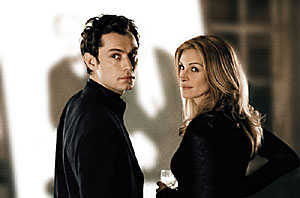 |
|
photo courtesy of COLUMBIA PICTURES
|
Julia Roberts and Jude Law star in Mike Nichols' "Closer." Law has been in a lot of movies this fall and Roberts just had twins. Those were Movie Fast Facts, brought to you by Coca-Cola.
|
|
|
By Celeste Meiffren
Arizona Daily Wildcat
Wednesday, December 8, 2004
Print this
"Closer" is a beautiful and intriguing movie. It is, however, very difficult to enjoy.
Director Mike Nichols, who brought us "The Graduate" and "Primary Colors," choreographs four unlikable characters in a kind of freeze-tag game of love set in London.
Dan (Jude Law), an obituary writer, and Alice (Natalie Portman), a young, American ex-stripper, are the first to fall in love. Dan writes a book about Alice's life. When he goes to get his picture taken for the back cover, he falls in love with the American photographer, Anna (Julia Roberts), almost instantly.
After Anna refuses Dan's advances, he goes online and, using Anna's name, has a sex chat with a random man. After a startlingly raunchy online conversation with this man, Dan sends him to a place that Anna frequents, as a joke. When this man, Larry (Clive Owen) finds Anna, despite the intention of the encounter, they hit it off.
Fast forward. Dan and Alice are together, and Anna and Larry are married. This is when the heartache truly begins. Dan and Anna have fallen in love and have a yearlong affair before they decide to break things off with their respective spouses. The spouse trading continues for the rest of movie, and frankly, it puts "Wife Swap" to shame.
"Closer" is an extremely stylized movie. The movie jumps ahead in time weeks, months or even years without indication or warning. The shots are primarily close-up shots, giving a real sense of intimacy between the characters, and between the characters and the audience. Nichols uses the song "Blower's Daughter" by Damien Rice to serve as bookends for the movie. The song introduces and concludes the film very well. Plus, "Closer" is almost entirely dialogue-driven, and there are only four characters throughout the entire film. Nichols' trademarks shine through the nuance.
Patrick Marber adapted his play for the film. While watching the film, it becomes evident that it was a play because of the complexity of the characters and the strong dialogue. Besides Natalie Portman's stripping scene, there is very little action. It is merely the four characters talking, yelling or crying.
Normally, dialogue cannot hold an entire movie. "Closer," however, remains engaging even without the action. It is aggressive, emotional and a bit over-the-top raunchy.
The words are brought to life by a very talented ensemble of actors. Portman is finally an adult - not only an adult, but also an adult entertainer. Law plays another arrogant man, which he seems to always do well. Roberts is tolerable for once in apparently the last film she'll do for a while (because of her lovely babies). And Owen has his breakout performance as the least likable character and the strongest actor in the bunch.
"Closer" has a lot of value as a movie. Nichols, Marber and the ensemble give their best to bring an honest and compelling film to the screen, even if it's not easy to sit through because of all of the betrayal, heartache and unlikable characters.
See "Closer," but don't expect to enjoy it.
